

Chromosome Maintenance. Group Leader: Dr Kazunori Tomita Introduction Why can cancer cells propagate indefinitely?
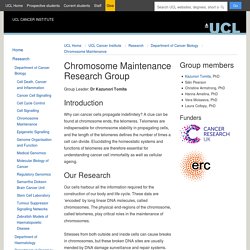
A clue can be found at chromosome ends, the telomeres. Telomeres are indispensable for chromosome stability in propagating cells, and the length of the telomeres defines the number of times a cell can divide. Elucidating the homeostatic systems and functions of telomeres are therefore essential for understanding cancer cell immortality as well as cellular ageing. Our Research Our cells harbour all the information required for the construction of our body and life cycle. Stresses from both outside and inside cells can cause breaks in chromosomes, but these broken DNA sites are usually mended by DNA damage surveillance and repair systems.
Cancer cells escape this programmed cell scenesence by activating a protein called telomerase. To address these issues, we primarily employ fission yeast as a model system. 1. 2. 3. 47829 bmat test specification. Flexible Combined Honours with Study Abroad BA/BSc - Exeter. Programme structure The modules we outline here provide examples of what you can expect to learn on this degree course based on recent academic teaching.
The precise modules available to you in future years may vary depending on staff availability and research interests, new topics of study, timetabling and student demand. UCL London's Global University. In each year of your degree you will take a number of individual modules, normally valued at 0.5 or 1.0 credits, adding up to a total of 4.0 credits for the year.
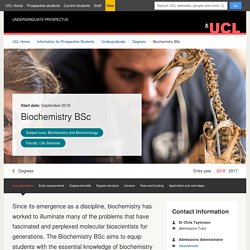
Modules are assessed in the academic year in which they are taken. The balance of compulsory and optional modules varies from programme to programme and year to year. A 1.0 credit is considered equivalent to 15 credits in the European Credit Transfer System (ECTS). In the first year of the programme you will take compulsory core modules that are similar to those taken in the first year of other biosciences programmes. In year two, you take a number of compulsory modules, but with some optional flexibility. Natural Sciences. Natural Sciences (NST) is the framework within which most science subjects are taught at Cambridge.
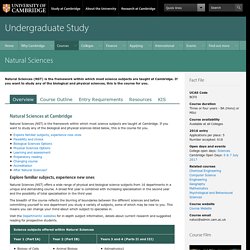
If you want to study any of the biological and physical sciences listed below, this is the course for you. Explore familiar subjects, experience new ones. Biochemistry (Molecular and Cellular) Biochemistry (Molecular and Cellular) Biochemistry(BSc)/Undergraduate degree/University of Warwick/c700. What will I learn?
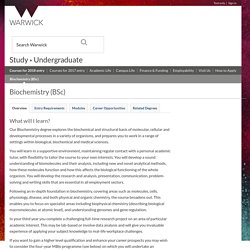
Our Biochemistry degree explores the biochemical and structural basis of molecular, cellular and developmental processes in a variety of organisms, and prepares you to work in a range of settings within biological, biochemical and medical sciences. You will learn in a supportive environment, maintaining regular contact with a personal academic tutor, with flexibility to tailor the course to your own interests. You will develop a sound understanding of biomolecules and their analysis, including new and novel analytical methods, how these molecules function and how this affects the biological functioning of the whole organism. You will develop the research and analysis, presentation, communication, problem-solving and writing skills that are essential in all employment sectors.
Following an in-depth foundation in biochemistry, covering areas such as molecules, cells, physiology, disease, and both physical and organic chemistry, the course broadens out. BSc Biology and Chemistry (CFG0) - Course Information. Course Summary Description BSc Degrees The BSc Natural Sciences degree provides a wide choice of subjects to study and does not require applicants to study any particular subject.
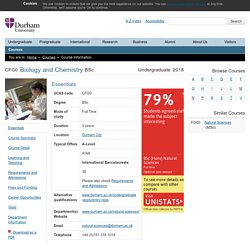
These subjects are divided into three groups: BSc Biological Sciences (Molecular Genetics) BSc Biological Sciences (Molecular Genetics) BSc Biological Sciences (Molecular Biology) BSc Biological Sciences (Genetics) Year 1 As an integral part of your studies, you will gain key skills which will enhance your long-term employability.
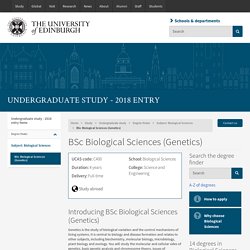
In addition, you will learn core laboratory techniques and study modern biology subjects which span the breadth of the biological sciences subject areas and may also include biological chemistry. There will be compulsory courses dependent on your chosen programme path and you can also choose option courses, which can be from other academic areas from across the University. Year 2 You will begin to specialise in a specific biological sciences area. You can still choose courses from other areas of the University as option course choices. BSc Biological Sciences (Cell Biology) BSc Biological Sciences (Biochemistry) Year 1 As an integral part of your studies, you will gain key skills which will enhance your long-term employability.
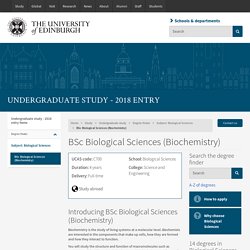
In addition, you will learn core laboratory techniques and study modern biology subjects which span the breadth of the biological sciences subject areas and may also include biological chemistry. There will be compulsory courses dependent on your chosen programme path and you can also choose option courses, which can be from other academic areas from across the University. Molecular Biology,C440 - Undergraduate prospectus 2017. Student profile "I love how many job opportunities I have for the future - research, analysis...
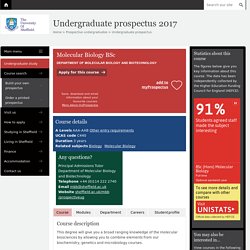
It is very exciting to be at the forefront of such a new and exciting area of science. " Ben Daniels , Undergraduate <a href="#content">Back to top</a> Medical Genetics,C431 - Undergraduate prospectus 2017. Student profile "The module choices allow you to be specific to a particular field such as biochemistry or to gain a broader knowledge across several fields such as genetics and molecular cell biology.
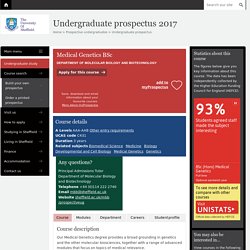
" Jason Brocklesby , Undergraduate. Genetics,C400 - Undergraduate prospectus 2017. What our graduates do Many of our graduates are employed in pharmaceuticals and health care, food safety and manufacture, brewing and agrochemicals, forensic science and as NHS scientists.
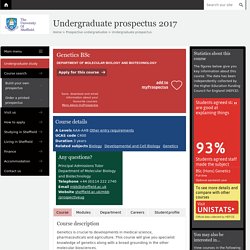
They also work in education, the scientific civil service, bioinformatics or medical schools. Others use their skills in management and commerce. Many choose further study and go on to do research for organisations all over the world. Genetics and Molecular Cell Biology,CC47 - Undergraduate prospectus 2017. Student profile "The module choices allow you to be specific to a particular field such as biochemistry or to gain a broader knowledge across several fields such as genetics and molecular cell biology. " Jason Brocklesby , Undergraduate <a href="#content">Back to top</a> What our graduates do. Biochemistry and Molecular Cell Biology,C790 - Undergraduate prospectus 2017. Student profile "The most exciting part of the course is labs.
Using techniques that have only been theoretical up to this point is really nerve- wracking at first. Then you realise that this is the type of equipment and methods used in labs all over the world to find new drugs, vaccines and to discover how cells work. It's really interesting. " Emily Gallagher , Undergraduate.